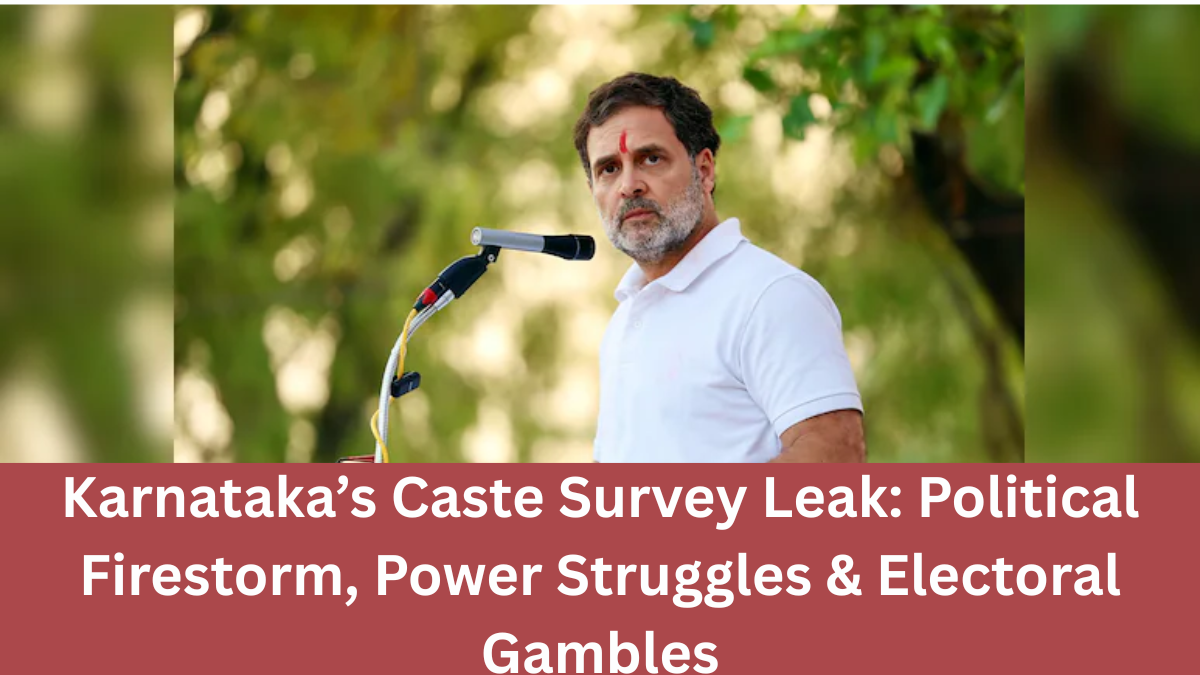The recent leak of Karnataka’s caste survey has unleashed a political storm across the state. It’s not just numbers on paper—it’s shaken the very foundation of party dynamics, community identities, and power equations.
Some Congress leaders want the survey report scrapped altogether. Meanwhile, community seers from dominant groups like Lingayats and Vokkaligas are up in arms, calling it “unscientific” and threatening state-wide protests.
Let’s unpack what’s really going on—and why it matters so much.
 Caste Survey vs. Census: What’s the Difference?
Caste Survey vs. Census: What’s the Difference?
Before diving deeper, it’s important to understand that surveys aren’t as thorough as censuses. Many households in Karnataka say survey teams never even knocked on their doors.
-
Surveys: Conducted at a smaller scale, often face logistical issues, more prone to error
-
Census: Large-scale, nationwide, methodically executed, legally binding
Karnataka’s Caste Composition – Reported Findings
Here’s a snapshot of the leaked caste/community-wise data from the survey:
| Community | Percentage |
|---|---|
| Scheduled Castes | 18.27% |
| Scheduled Tribes | 7.16% |
| Muslims | 12.87% |
| Lingayats | 11.09% |
| Vokkaligas | 10.31% |
| Kurubas | 7.31% |
| Brahmins | 2.61% |
| Total OBCs | 70% |
| SCs + STs | 25% |
| Upper Castes | 5% |
The Reservation Equation: What’s at Stake?
The Congress-led Karnataka government is reportedly eyeing a reservation overhaul. Here’s how that looks:
| Group | Proposed Reservation |
|---|---|
| OBCs | 51% (up from 32%) |
| SCs + STs | 24% |
| Economically Weaker Sections (EWS) | 10% |
| Total | 85% |
Note: Raising the reservation cap beyond 50% requires Supreme Court approval.
Political Hotspots: Why Lingayats & Vokkaligas are Protesting
Two of Karnataka’s most politically influential communities feel underrepresented in the leaked data.
Lingayats:
-
Claim to be 35% of the population
-
Political influence in 124 constituencies
-
Strong base in Bombay & Hyderabad Karnataka
Vokkaligas:
-
Claim 15% of the population
-
Hold sway in 75 constituencies
-
Dominate Old Mysuru & Bengaluru Karnataka
According to electoral math, their combined strength is estimated closer to 30%—far below their claims.
Why Congress is Nervous
In 2023, Congress secured 135 out of 234 seats, thanks in part to support from these groups:
| Community | Congress Vote Share (2023) |
|---|---|
| Vokkaligas | 49% |
| Lingayats | 29% |
The leaked data—and the party’s future reservation plans—could alienate these key vote banks.
Infighting in Congress: A Tussle for Power
The caste survey has widened internal rifts within Karnataka’s Congress:
-
G. Parameshwara and M.B. Patil are pushing for Deputy CM roles
-
D.K. Shivakumar’s camp is eyeing a rotational CM setup by Nov 2025
-
CM Siddaramaiah is suspected of downplaying dominant castes to tighten his grip on power
It’s become a political chessboard—with every move closely watched.
🇮🇳 Congress’s National Ambitions: OBC Math for 2024 & Beyond
This isn’t just about Karnataka. Rahul Gandhi is hoping the caste narrative helps revive Congress nationally, especially among OBC voters.
-
In 1971, Congress had 46% OBC support
-
By 2024, it dropped to 19%, per CSDS data
-
The INDIA bloc received just 25% of lower OBC votes in 2024
-
Meanwhile, the NDA secured 58% of this segment
Congress’s Risky Strategy: Winning the Majority by Losing the Dominants?
Here’s the math behind the gamble:
| Community Group | Population Share | Congress’s Bet |
|---|---|---|
| Vokkaligas + Lingayats | 21% | Possible loss |
| Muslims + Kurubas | 20% | Strong support |
| Other OBCs (Naidu, Ediga etc.) | 30% | Swing votes |
Congress is counting on a broad coalition of OBC, Muslim, Dalit, and tribal votes to offset any backlash from dominant castes.
Why This Matters for India’s Future
Karnataka becomes only the second state after Telangana to conduct and release a caste survey. Rahul Gandhi is leveraging this moment to:
-
Pressure the Modi government into a nationwide caste census
-
Champion higher OBC quotas
-
Push the narrative: “Jiski jitni sankhya bhaari, uski utni hissedaari”
If this catches fire nationally, it could shift the electoral landscape—again.
Frequently Asked Questions (FAQs)
1. Why are Lingayats and Vokkaligas protesting the caste survey?
They believe the leaked data understates their actual population, thereby threatening their political influence and future representation in government.
2. Will the caste survey impact Karnataka’s reservation policy?
Yes. If accepted, the data could justify increasing OBC reservations to 51%, taking total reservations to 85%, pending Supreme Court clearance.
3. How does this survey affect the national political scene?
It gives Congress a potential edge to regain lost OBC support, positioning Rahul Gandhi as a champion for backward classes ahead of national elections.
4. Is the caste survey legally binding?
No. Unlike the Census, a state-conducted survey is not legally binding but can influence policy recommendations and party manifestos.
Click here to learn more
Pari is a passionate writer known for captivating stories that blend imagination and reality. Inspired by travel, history, and everyday moments, Pari crafts narratives that resonate deeply with readers.